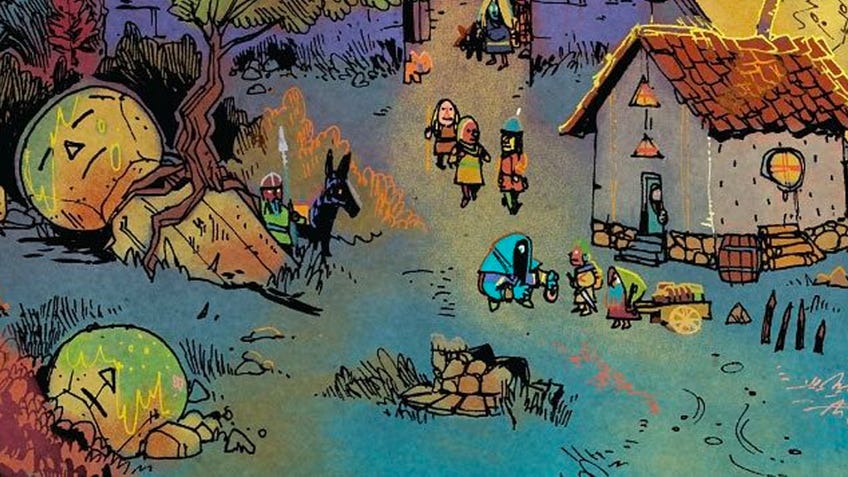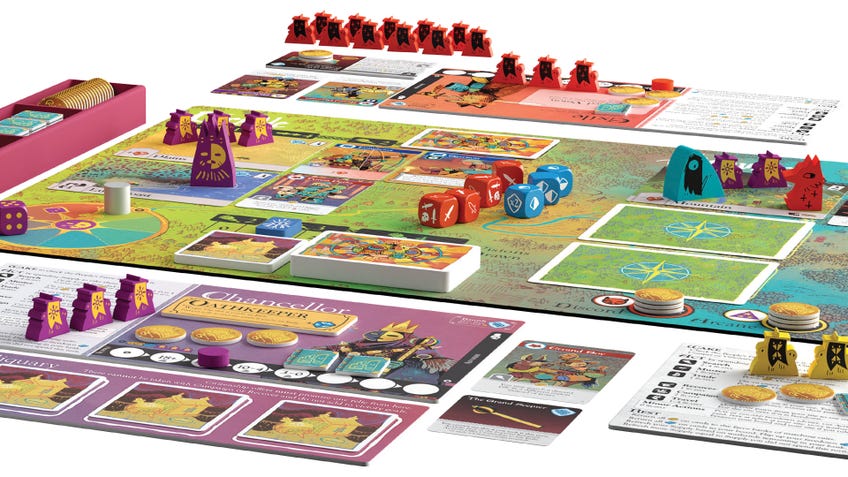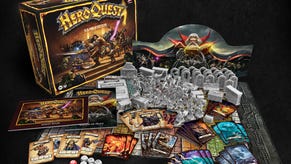Oath board game review - Root creator’s ambitious ‘game with a memory’ is unforgettable
History in the making.
In board games, perhaps more than any art form, there are two types of story. Some board games tell stories - your narrative-driven adventures that weave together players’ actions with licks of flavour text on cards, branching passages in dedicated storybooks or a lore dump at the front of the rulebook. Other games are stories, providing - at the extreme - little more than a mechanical skeleton of rules for players to flesh out with their own memorable moments that happen around the table rather than on it.
Oath: Chronicles of Empire & Exile sits at the intersection of these two story types; it’s as much a game explicitly about stories as it is a game that inspires stories among its players. What makes Oath unlike any board game I’ve played before, though, is that it’s a game that remembers these stories as much as the players who experience them.
The game takes place in an unnamed empire. It’s a land ruled by a chancellor - one of the players. The rest of the group, at least to begin with, are exiles: upstarts that lack the chancellor’s dominance and strength, but have the ability to amass their power, carve out a piece of the empire for themselves and ultimately wrest control from the current ruler.
Unlike designer Cole Wehrle’s breakout hit Root, all of the players have the same set of options and actions - for the most part - at their disposal. They move their character between three regions - the Cradle’s seat of power, its outlying Provinces and the distant Hinterlands - to visit locations, represented by site cards, and interact with the denizens of the land, represented by yet more cards. Performing actions largely comes down to revealing more cards from the deck and using their abilities - denizens can occupy a site, making them available to whoever has control of the location and anyone passing through, or be recruited as personal advisors for one player’s exclusive use - or trading in Oath’s two key resources of favour and secrets. Actions are performed using supply, which refills each turn based on the size of your army - an elegant way to make smaller forces more nimble, while powerful warbands cost more to control.
Oath is a game of small, thoughtful details that come together to envelop the players in its evocative world and deep strategy.
On the face of it, Oath’s core gameplay is simple: go somewhere, do something, repeat. Scratch slightly under the surface, though, and you’ll quickly find the impressively complex and impeccably considered strategy game you’d expect from the mind behind Root, Pax Pamir and John Company. It is a game of small, thoughtful details that come together to envelop the players in its evocative world and deep strategy - all without burying them in pages of established lore or overly complicated rules.

There’s the way that favour - represented by coin-like tokens - circulates in a closed economy between the players and a number of different factions, rather than in and out of a supply or central bank. When players pay to use a card’s ability, their favour goes to the matching faction - and vice versa when they trade for favour using the same card. That means that a popular faction can find itself short or flush with cash, with the players’ choices determining the strength and sway of the land’s inhabitants. In practice, it’s as simple as moving coins between matching symbols, but considering which factions might be able to aid your opponents - and sucking away the influence of those that could - becomes a key part of the crunching gears of the world. Contrasting the back-and-forth transaction of favours, secrets instead act as a renewable currency that returns to the respective player’s board at the end of their turn, representing the more underhanded intrigue and influence of the player’s character.
Oath has an impressive ability to show rather than tell.
Like the ideas of favour and secrets, Oath’s places and peoples are deliberately evocative rather than explicit. Visiting The Buried Giant, conversing with the Storyteller, experiencing the Vision of Faith and acquiring the Darkest Secret conjure up powerful images of the world - helped by hundreds of stunning illustrations by Root artist Kyle Ferrin - but the extent of the game’s storytelling is confined to card names and images, with not a word of flavour text in sight. It speaks to Oath’s impressive ability to show rather than tell, rightly confident that its gameplay and visuals are enough to spark the imagination of players into making the world their own. This personal, collaborative world-building isn’t limited to some abstract imagined way outside of the game itself, either.

The cherry on top of Oath’s generous helpings of rich gameplay and lashings of narrative sauce is the Chronicle system. A little like the permanent alterations and player-driven effects seen in games such as Pandemic Legacy - and at the same time nothing like that - the Chronicle system offers the similar sense that every session of Oath is connected. The difference here is that there’s no fixed story arc or definitive end, and the game’s pieces are never torn up or permanently changed - the world can keep evolving and changing, forever. The sites and denizens on the board at the start of the next game reflect the outcome of the last. A chancellor ousted from power can see their allies and advisors cast from the land for generations and their empire reduced to ruins, while the cradle of power rearranges around the regions held by the newly-crowned exile-turned-ruler as they construct new edifices and reward those who helped them in their rise.
Like games such as Pandemic Legacy, the Chronicle system offers the sense that every session of Oath is connected.
Even the way in which a player rises to power has a defining effect on the shape of the land. Each game sees the current chancellor attempt to cling to power, attempting to maintain their rule in the face of the exiles’ varied threats. Rise to power with military might and you’ll need to keep control of your lands by force. Gather the backing of the people and you’ll need to keep topping up their diminishing favour or risk revolt. Scheme with intrigue and your own secrets will need to remain protected. The game opens with a single way of winning - the chancellor begins in the lead, but must keep running to stay ahead - but more can soon be discovered and introduced to play by the exiles, escalating the danger they pose and forcing the chancellor to fight on multiple fronts. It’s a brilliantly thematic way of capturing the uneasy nature of being in power, while also giving players more than one objective to pursue.
Oath chooses its moments of excitement carefully. Campaigns - fights between players to seize land, precious relics and banners, or simply to trash their supply of favour - are suitably costly and devastating. Dice rolls land like bombshells, providing the chance to multiply a paltry defence to an impenetrable shield or sacrifice attackers for unstoppable power. The nail-biting unpredictability means battles are never a foregone conclusion and never lose their potency.
Every session drums itself into a crescendo, with early turns spent building momentum and searching for openings to threaten the chancellor before things come to a head. It’s a race for the current ruler to hold on until the terrifically tense fifth round, when a single die roll can instantly end the game - often in their favour. Hoping for one more round to make your grab for the throne - or dreading the need to fend off another barrage of attacks - makes for a suitably thrilling finale.

The seat of power ultimately has room for only one backside, but players can cram on the throne together before squeezing their opponent onto the cold floor. One of Oath’s gameplay masterstrokes is the ability for the chancellor to offer citizenship to an exile, turning them into an unlikely ally at the cost of a precious relic from their treasury - along with anything else the exile can convince them to part with. It’s a risky but sometimes necessary move that comes with risks and advantages to both players. The exile loses their autonomy, merging their troops and supply with their newfound ruler, but gains the opportunity to sneakily usurp the chancellor as their successor via an additional win condition. For the chancellor, meanwhile, it boosts their military presence and softens an enemy into a frenemy - though that largely means the chance to catch a dagger in the back rather than the front.
Oath is among the finest frameworks for emergent storytelling on the tabletop I’ve experienced.
The interaction between players as they shift between opposition and alliances leads to Oath’s greatest moments. While playing for review, I had a session where the Chancellor was forced into partnership with the exile they had previously been feuding over territory with in order to stop a next-round win by a player who executed a sudden vision reveal - only for the Chancellor to then try to force the newly-allied citizen back into exile (a costly endeavour) to avoid losing to a would-be successor. They’re moments that stand up as some of the most exciting and memorable I’ve had in any game, cementing Oath as among the finest frameworks for emergent storytelling on the tabletop I’ve experienced.

This exceptional storytelling and strategy does come at a cost, though it’s ultimately one worth paying. Oath’s guided tutorial does a strong job of introducing basic gameplay concepts while you play, running through almost everything you need to know in the space of a few turns before letting you loose to dig into its depths. That said, there’s still a lot to absorb upfront in terms of concepts and terminology, and you’ll likely need a full game or two to really grease its mechanical cogs before you feel fully comfortable and able to enjoy the collaborative world-building and narrative.
You’ll likely need a full game or two to really grease its mechanical cogs before you feel fully comfortable and able to enjoy the collaborative world-building and narrative.
The other cost that Oath demands is time. It’s as broad as it is deep, with games towards the upper end of the one-to-six player count racking up the hours. I’ve played multiple games with groups of two, three and four - in person as well using Leder Games’ official scripted Tabletop Simulator mod - and found four people to be the sweet spot to allow the necessary inter-player politics to blossom. With four, though, the downtime between turns becomes more apparent - with six, I can imagine needing to set aside a handful of hours, especially with newcomers. While the basic actions are quick to grasp and perform, the game’s meat comes in the interaction between players and the endless possible combinations of cards on the table - and that requires spending time and energy over multiple sessions to really get the most out of.

Not all that time is spent playing, either. The game’s setup is fast once you’re familiar - you can get playing in under five minutes - but it backloads the need to rebuild the world deck that represents Oath’s dynamic universe after each session. Doing so provides a pleasing preview of the next game’s setup, but it can be odd to then pack it all away if you don’t have time for another run. While Oath’s open narrative isn’t as dependant on the same group of players returning to the table for every session as something like Pandemic Legacy, its emergent stories, strategies and world thrive best with the same people, who can form memorable mini-narratives as they pledge and break alliances across handfuls of playthroughs.
This is one of the longest reviews I’ve ever written about a game, but Oath is the kind of game that makes you want to talk about it - with the people you play with, with people who wonder what board games have to offer at their best, with anyone who just loves hearing fun stories of diplomacy, intrigue and betrayal in colourful fantasy worlds. Cole Wehrle has added another masterpiece to his already gleaming collection of games that are as interesting around the table as they are on it. If you’re willing to invest in Oath, Oath will repay you handsomely. It won’t forget the games you play, and neither will you.
Oath: Chronicles of Empire & Exile will be released this August, and is available for pre-order directly from Leder Games.






